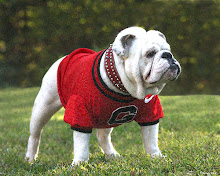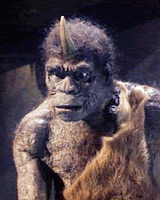In memory of my grandfather, J.C. Benton, who died seven years ago today. I wrote this for a creative writing class in grad school while my grandfather was sick but didn't finish it in time to read it to him before he died. That night, I finished it and read it as his funeral.
I knew when he swapped hats my grandfather was ready to fish. He'd slip off his cap worn high on his forehead, advertising some long extinct outboard motor company or emblazoned with the Colquitt County Packer emblem, and replace it with his wide-brimmed straw fishing hat. Yes, it was only a hat, but it was tradition, symbolic of countless hours spent honing a craft that he only perfected. Others in our family are adroit fishermen, but my grandfather was the master craftsman, expert with a rod and reel or a cane pole, equipped with the nimble moves of a NASCAR driver on the trolling motor.
My grandfather's skills were God-given, but he'd spent a lifetime on the river. He fished the waters of the St. Johns as a boy, first brought to the river by his father, my Great-granddaddy Benton. They fished out of Palatka, 45 miles north of where my grandfather would eventually bring me, for mullet and bream. Those early fishing trips taught him the love of the open water while giving him the innate ability to fish the tightest overhangs. Without those early trips, my grandfather might never have discovered the river. Without the river, two generations of my family would have lived lives of lesser fulfillment.
He wore the cap on the truck ride down to the river, high, barely covering the wavy mop of white hair that served as his crown. Packing, unpacking, and packing again, the cap was a fixture. He worked the boat wearing the cap, storing bait and ice chests, passing out life vests. He and his cap would settle into the captains chair and, with a backwards glance and a smile, he'd gracefully maneuver the boat from its slip, tongue pushed to the side of his mouth, an unconscious reaction to everyday concentration.
Even on the ride out, his cap remained with the least bit of effort. I, on the other hand, lost two hats on that river, ripped from atop my head by the combined forces of a speeding boat and the open-water breeze, reducing me to ride with one hand high, holding my hat in place like some Spaghetti-Western damsel-in-distress, bonnet bobbing in a runaway carriage scene. Even in the stiffest winds, my grandfathers cap never moved, anchored as steadily and stubbornly as my grandfather himself, the hat a natural extension of the man.
Cutting the engine, the boat would sputter to a stop. Here, my grandfather's moves were deliberate and ritualistic, passing out poles and splitting bait, holding a bare modicum of balance against the rocking of the boat. Equally deliberate, my grandfather would change hats, moving from world to world, work cap to fishing hat, trading in every day life for the river. I searched for symbolism in the act, some sort of metaphor about casting off daily life for the peace my grandfather found in fishing. The real answer, I found, was less poetical.
"When the water is shallow, you can see fish in the shadows that you cant see with a cap on," he muttered matter-of-factly, a tone denoting his grandson should already know the answer to such simple questions. "Sometimes, you can't see for the light."
We'd float for hours on the river, shifting directions intermittently to the tune of his trolling motor, telling stories and jokes, laughing. I learned life's lessons from my grandfather, his blue eyes blazing from under the brim of his hat. He'd tell me about his parents and grandparents, about basketball trips and childhood pranks, even family secrets my parents had so carefully misplaced. We discussed the damage alcohol had inflicted on our family, the topic punctuated with stories of family members offered to the belly-god of malted barley. We talked of his own conversion and redemption, a peaceful realization with repercussions stretching into the next life. We discussed theology and politics, the latter of which focused more on common ground than differences. Through it all, my grandfather was truthful beneath his old hat. Good, bad, and sometimes terrible, he never hid facts from me, laying it all out without mincing words or prettying-up the unpretty. He opened my eyes on those trips.
Our days fishing gave me an understanding of how short life is, just how tentative our grasp is on this world, so little keeping us from slipping into the next. You could tell he didn't feel anywhere near the number of years he had lived, some 70-plus years removed from his birth, a half a century of life lived after Bigmama's house and the beginning of his marriage.
His stories allowed my mind to wander through my own plans for the future, pondering how quickly our own designs change because of the experiences life has in store for us. Would I end up back in my hometown with a nice little house, grandkids, and a modest retirement? Or was something else planned for me, some great unknown, a hand-written destiny that would someday guide me away from all this?
As if reading my mind, my grandfather said, "You know, my dad used to bring me out here to fish, and I brought my children and my grandchildren. One day, you'll bring your children, and maybe one day you'll bring your own grandson for fishing trips out here on the river."
I smiled, first to myself, then at him, knowing he was right, his intense blue eyes driving the simple statement home. One day my life will float along the same currents and around the same bends as my grandfather's. One day I will be the old man in the hat, leading my progeny to the fishing holes of my youth. One day will find me in the twilight of my own life, my own fishing trip almost over. Like my grandfather when that day comes I hope I am an "imitation" of the man, to quote the Dan Fogelberg song, a living legacy to a life well-lived.
As the sun set behind Shell Point, my grandfather would begin to wind up his line, casting the last drowned worm into the water, allowing it its place in the cycle worm to fish, fish to man, man to worm. I wasn't ready yet, not knowing if this would be my last time on the river with my grandfather, and I awkwardly swung my line out among the river grass, hoping for one last fish in the basket, a last moment on the river with the master. My grandfather smiled, perhaps remembering his grandsons pleadings as a child, "Come on, Granddaddy, just one more cast."
The fishing done, his grandson satiated, my grandfather changed hats again, replacing the wide-brimmed straw hat with his cap, ready to again face reality. He packed the poles away with equal ritual, and I followed suit, knowing that there is only one way one should pack away the boat: my grandfathers way, lest you are scolded and shown the correct way...again.
He returned to his captain's chair with a look back at me. We smile, and he asks me if I want to drive us back in, knowing I always do. We swap seats, my grandfather seated behind me, hand on my shoulder, finger directing me around crab traps and pointing to landmarks he'd shown me since my youth. The boat bounced over the breakers, across the leftover wake of a larger bass boat, headed for home carrying two fishermen, a boy and his grandfather, both at different points in their own fishing trips, but both fishers of the same river.









